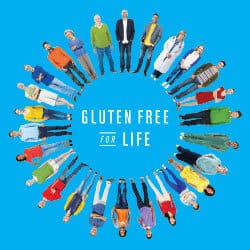

Each year we ask our members to share their lived experiences of coeliac disease to raise awareness, promote understanding and foster a supportive community for those affected by the condition. If you would like to share your story please email admin@coeliac.org.nz
This is Rebecca Tibbots' journey..."I have suffered from daily abdominal discomfort since childhood. Fruit made it worse, so I avoided it. The symptoms reduced but never went away. At the end of each day, my abdomen would be bloated and uncomfortable. I kept the issue to myself to not be a bother and often didn't feel like socialising due to it.
When I left high school and attended University, I cut out bread and almost all other carbohydrates to try and relieve the discomfort. This helped, but unfortunately led to an eating disorder. I did get a Coeliac blood test. However, I was never told I had to be eating gluten beforehand, so it was initially negative. This is one part of blood testing for Coeliac Disease that could be improved and lead to earlier diagnosis.
Over time, I began eating more to get to a healthier weight and got a job after graduating. I often felt let down by the medical system when I brought up the abdominal pain and discomfort.
This year, the abdominal pain became chronic, so I requested another blood test for Coeliac Disease. This time, it came back sky-high positive. An endoscopy and biopsy confirmed both Coeliac Disease and Sucrase/Maltase deficiency. This also explained why fruit and many other foods made the discomfort worse. It was a relief to finally get a diagnosis over age of 40. One challenge is eating a gluten free reduced carbohydrate diet and learning to enjoy food again. The other challenge is letting friends, colleagues and cafes know what gluten is, about gluten cross-contamination and that Coeliac Disease is a permanent reaction to gluten. Even trace amounts will do damage. Cafes often store gluten-free foods right beside gluten-containing foods or use shared utensils, which leaves very limited options for those with Coeliac Disease. It also takes weeks to months to recover after being diagnosed, so we will have good days and bad days".
This is Jenny Stoddard-Howell's journey...I was diagnosed with coeliac disease at the age of 36 in 2019. It was a massive relief, finally putting an end to years of searching for answers to a myriad of seemingly unrelated symptoms that had been limiting my ability to live life to its fullest. However, this relief was accompanied by a significant period of adjustment. No one in my family had coeliac disease, and none of my friends or work colleagues were familiar with the condition at the time. Navigating this new reality became a journey of both education and adaption including in the workplace.
Starting a new job is always a whirlwind of emotions, a mix of excitement and nerves. But for someone like me, living with coeliac disease, there’s an added layer of apprehension about sharing my health condition with new colleagues. I don’t like being “that person” with difficult food preferences, but my food restrictions as with anyone with coeliac disease are far from mere preferences—they are essential for my well-being. Coeliac disease isn’t a health condition you can keep to yourself because it is directly related to a fundamental daily necessity - eating.
Over time, I’ve picked up some valuable tips to navigate the inevitable awkwardness and misunderstandings that arise in a workplace around food that I can eat and how the work kitchen can be kept a safe environment for me.
I’ve found that communicating my dietary restrictions even before starting a new role can help prevent any surprises, especially during those tricky welcome morning teas. Managers appreciate the heads-up, and they’ve always been more than willing to accommodate my needs.
Shared unches have proven to be the most challenging aspect of being coeliac at work. It can be a minefield, where good intentions to provide gluten-free options are often overshadowed by uncertainty about their safety. However, I’ve learned to see these occasions as opportunities to educate my colleagues about coeliac disease. Sharing what foods are safe has been greeted with curiosity and support among my peers. I like to bring delicious gluten-free treats to these gatherings. Not only does it introduce my colleagues to safe options, but it also showcases that gluten-free can be just as tasty.
I’ve been fortunate to have had colleagues who’ve gone above and beyond to ensure that team lunches or events include gluten-free options without requiring me to request this. Their thoughtfulness has spared me the constant need to advocate for myself. If you have a workmake with coeliac disease a small gesture like this can make a world of difference for them. Talking about any health condition at work can be tough, and discussing coeliac disease is no exception. However, I’ve noticed that by sharing my journey, I’ve created an environment where others feel empowered to open up about their own challenges or health conditions. This openness and understanding have strengthened our team bond, creating a more supportive and inclusive work environment.
BECOME A MEMBER: during June and pay only the annual member subscription and save $35 off the joining fee.